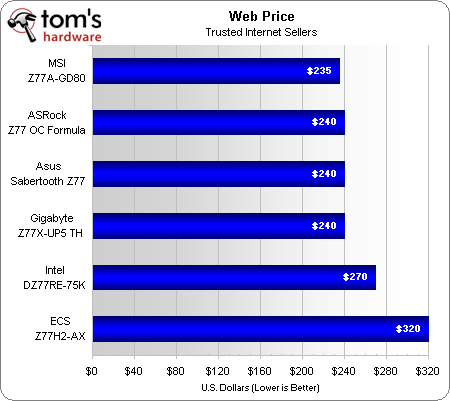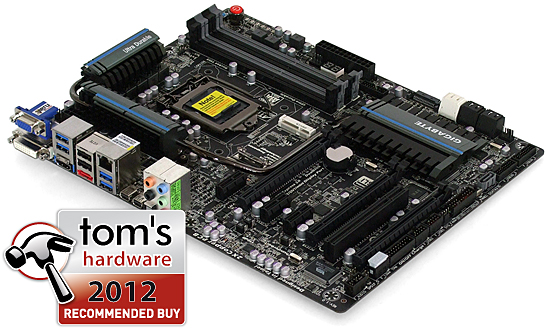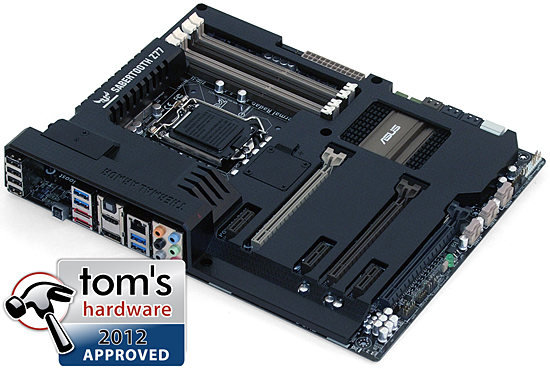Six $220-280 Z77 Express-Based Motherboards, Reviewed
Expanded graphics card support, enhanced on-board features that include Thunderbolt on some models, and more-robust voltage control are all good reasons to consider paying a little extra for a higher-end motherboard. Today we examine five top choices.
Picking The Right High-End Z77 Board
Today’s motherboard comparison has two distinct groups of platforms: those with and those without Thunderbolt technology. Of the boards without Thunderbolt, ECS had the best features.
Unfortunately, ECS' Z77H2-AX falls completely outside of today’s budget range. The company simply wasn’t able to maintain its temporarily-deflated price until after our review got published. Asus and ASRock are our remaining non-Thunderbolt choices, and both are fairly well matched for features and stability, yet Asus's five year warranty trumps the three years of ASRock.
All of the Thundebolt boards are heavily compromised due to the scarcity of PCIe lanes inherent to Intel's Ivy Bridge architecture. The worst-compromised board lacks the PCIe switch needed to activate all of its interfaces at once, but comes in cheaper than even the non-Thunderbolt-equipped boards. If your needs are almost completely addressed by Intel's Ivy Bridge processor design, third-gen PCIe x16 graphics, and a single Thunderbolt port, MSI’s Z77A-GD80 looks like a good value.
Gigabyte beats Intel in Thunderbolt support by offering two connectors, but lacks Intel’s secondary gigabit Ethernet controller. The Z77X-UP5 TH is also $30 cheaper than the DZ77RE-75K, and few of use would pay $30 for the extra network controller. Both boards also include Wi-Fi/Bluetooth combo modules. From a pure value perspective that doesn’t account for any specific user’s specific needs, Gigabyte’s dual-Thunderbolt-equipped Z77X-UP5 TH appears to offer more features per dollar.
In fact, the difference in price between Gigabyte and MSI solutions is only $5, and Gigabyte’s solution also includes the PCIe switch needed to activate all of its features simultaneously. That switch is worth more than the $5 price difference. MSI also lacks any Wi-Fi or Bluetooth capabilities, which we think are worth about four times the price difference. Add in the fact that the Z77X-UP5 TH has twice as many Thunderbolt connectors, and Gigabyte takes the value lead away from MSI in spite of the $5 price difference.
While Asus relied on an extended warranty to put its Sabertooth Z77's ahead of ASRock's Z77 OC Formula in value, hardware differences made it easier to pick a leader between various Thunderbolt solutions. Gigabyte leads that features-per-price battle without making any serious concessions in performance or overclocking, so the Z77X-UP5 TH earns its value award.
Our attempt to work out the value award mathematically assumes that Thunderbolt technology is worth as much as it costs, something that should be a safe assumption for anyone who thinks they might use this new technology within the next few years. But anyone who doesn't use that technology during the life of their next build will find no value in it, and anyone who's prone to motherboard failure will find exceptional value in Asus' extended warranty. Because both of these exceptions will likely apply to a large number of buyers, the Sabertooth Z77 also gets our stamp of approval.
Get Tom's Hardware's best news and in-depth reviews, straight to your inbox.
Current page: Picking The Right High-End Z77 Board
Prev Page Overclocking-
roberta As u have reviewed SIX (6) motherboards, the article's title should be:Reply
"Six $220-280 Z77 Express-Based Motherboards, Reviewed" -
mayankleoboy1 No SATA and USB tests ? data transfer speed differences will typically be noticable in everyday usage.Reply
Also, the time taken to show the windows loading screen/ BIOS page.. -
admit it.Reply
you really liked the black/grey dimms and PCI slots of the gigabyte better than the blue/black of the MSI! -
Crashman robertaAs u have reviewed SIX (6) motherboards, the article's title should be:"Six $220-280 Z77 Express-Based Motherboards, Reviewed"Let's see what the article says:ReplyThe one motherboard in today’s line-up with a 48-lane PCIe 3.0 bridge is ECS’ Golden Z77H2-AX. Unfortunately, this platform climbed $40 beyond the budget limit of today’s round-up in the time we've been reviewing it. We're tired of seeing board vendors playing pricing games based on our review schedule (this isn't the first time we're seeing a curiously-timed price move). So, since we put the work in to review ECS' submission, we're including our already-gathered data and simply withholding the board from any award candidacy.
mayankleoboy1No SATA and USB tests ? data transfer speed differences will typically be noticable in everyday usage.Also, the time taken to show the windows loading screen/ BIOS page..Would have covered windows load time except that it wasn't markedly different. That is, after disabling empty SATA controllers. If you count the time that it takes to get the "No Device Found" error on boards that have extra SATA controllers, you're penalizing a board for having more features.
Andrew Ku tests drive controllers. I'm trying to get him to "write the book" on controller performance, since dozens of boards use only a few different controllers. As for testing things like Z77 controller performance on board A vs Z77 controller performance on board B, it's a waste of time unless something is broken. So the article looked for "broken stuff". See the red bar on the first chart:
http://www.tomshardware.com/reviews/z77x-up5-th-z77a-gd80-z77-oc-formula,3305-22.html
With nothing broken, there's no excuse to test the Z77 controller six times. Back to me begging Andrew Ku for a comprehensive comparison of every SATA controller currently available on mainstream-brand enthusiast boards.
-
JeanLuc Arghh! Why the hell are you overclocking the base clock on Z77!! That will most likely cause permanent damage to your CPU.Reply -
You left out a key aspect for overclockers which is vcore offset.Reply
This allows ocer's to achieve higher overclocks while still retaining the power saving functions, instead of being forced to either reduce the overclock, or be forced to run high voltage 24/7.
MSI doesn't have this key feature. -
Onus I would think that the Sabertooth's five year warranty merits at least a mention in any value conclusion.Reply
-
luciferano JeanLucArghh! Why the hell are you overclocking the base clock on Z77!! That will most likely cause permanent damage to your CPU.Reply
Overclocking the BLCK is very unlikely to cause any damage, it's just likely to not give much of a stable overclock. -
Crashman jtt283I would think that the Sabertooth's five year warranty merits at least a mention in any value conclusion.I actually missed that, having checked the lesser brands just to make sure those still had their three year warranty. Will add it.Reply



